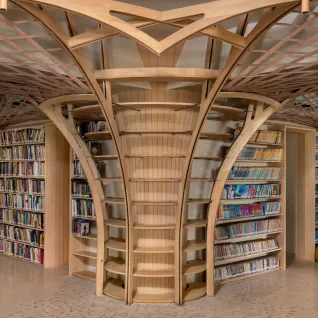i miss my library
pick up a book and sit awhile.
Add a task
Not Completed
Completed
I Miss My Library reflects a sense of nostalgia for a time when libraries were a regular part of life. Whether it’s the fond memories of childhood storytimes, late-night study sessions in college, or simply browsing shelves for an unexpected gem, libraries hold a special place in the hearts of countless individuals.


Access to Knowledge

A Safe and Inclusive Space

Community Building

Lifelong Learning
The Magic of Libraries
Libraries hold a special place in our hearts. They are more than just buildings filled with books; they are gateways to knowledge, imagination, and inspiration. The magic of libraries lies not only in the vast collection of books they house but in the unique atmosphere they create—a space where time seems to slow down, and the world outside fades into the background.
A Place of Endless Discovery
Step into a library, and you’re instantly surrounded by endless possibilities. Every shelf is filled with stories waiting to be discovered, knowledge waiting to be absorbed, and worlds waiting to be explored. Whether you’re looking for a specific topic or just browsing aimlessly, the experience of discovering something new, unexpected, and enlightening is part of the library’s charm.
There’s something incredibly fulfilling about flipping through a book that you didn’t know you needed, only to realize it’s exactly what you were looking for. The thrill of finding a hidden gem among the stacks is something that can’t be replicated by scrolling through digital screens. In a library, every corner holds a potential treasure.
The Sense of Calm and Focus
Unlike the distractions of the digital world, a library provides an environment designed for focus and quiet reflection. The soothing silence creates a space for deep thought, creativity, and learning. It’s the perfect place to escape from the hustle and bustle of daily life and immerse yourself in a world of ideas, stories, and knowledge.
For many, libraries represent a peaceful retreat—a place where one can read, study, or simply unwind. The absence of interruptions or distractions allows for an uninterrupted experience, something that’s increasingly rare in today’s fast-paced world.
A Hub of Community and Connection
Libraries are not just for reading—they also foster a sense of community. They host events, book clubs, educational programs, and workshops, creating opportunities for people to come together and share their love of reading and learning. Whether it’s a children’s story hour or an author talk, libraries bring people from all walks of life into one space, united by a shared interest in books and knowledge.
For many, a trip to the library isn’t just about borrowing books; it’s about connecting with others, exchanging ideas, and feeling part of something bigger than oneself. This sense of community is what makes libraries more than just places to borrow books—they are social hubs that nurture connections and relationships.


Libraries as Guardians of Knowledge
Libraries are also guardians of our collective history and culture. They preserve the wisdom of the past and ensure that future generations have access to it. In a library, you can find texts that have been passed down through centuries, providing valuable insights into human history, art, science, and philosophy.
Moreover, libraries are often the only place where individuals can access resources for free. They break down barriers to knowledge, offering equal opportunities for all. Whether you’re a student researching for a project or someone looking to learn something new, the library ensures that the pursuit of knowledge is accessible to everyone.
The Benefits of Visiting the Library
A Quiet Escape from the Hustle and Bustle
Libraries are designed to provide a quiet environment for focused reading and studying. In today’s fast-paced world, it’s often hard to find a peaceful space, but a library offers a haven to clear your mind and indulge in a bit of solitude.
Access to Diverse Resources
Libraries offer more than just books. From audiobooks and magazines to documentaries and research databases, libraries house a wide array of resources that cater to different interests. Whether you’re a student, a professional, or someone who just loves to learn, there’s something for everyone.
A Sense of Community
Libraries are not just places to read; they are also community hubs. From book clubs to author talks, libraries bring people together and foster a sense of belonging. The interactions you have in a library—whether with the librarian, fellow readers, or even the books themselves—create an unspoken bond that digital platforms can’t quite replicate.
Free Access to Knowledge
One of the greatest things about libraries is that they provide free access to knowledge. In a world where information can be behind paywalls or subscriptions, libraries remain a democratic institution, offering equal opportunities to anyone who walks through their doors.
Why We Miss Our Libraries
Libraries hold a special place in our hearts for several reasons, and the nostalgia we feel when we say, “I miss my library,” speaks volumes about the connection we have with these places. Here are some of the reasons why libraries are missed:
The Sense of Escape and Peace
In today’s fast-paced world, where distractions are endless, libraries offer a peaceful refuge. Whether it’s a quiet corner to read or a secluded space to think, libraries provide an environment where you can truly disconnect and focus. Unlike the constant interruptions of digital notifications, a library is a sanctuary of calm—something that’s hard to find in our everyday, tech-driven lives.
The Joy of Browsing Physical Books
There’s something uniquely magical about walking through rows of bookshelves, feeling the textures of the books, and exploring titles you might never have thought to pick up online. Physical libraries offer a tactile experience—something that browsing on a screen simply can’t replicate. The excitement of discovering a new book, leafing through its pages, and seeing its cover design is a joy that digital platforms can’t quite match.


The Community Feel
Libraries aren’t just about books—they’re also about connection. They host events, book clubs, reading hours, and author talks, creating a sense of community and shared experience. The people you meet at libraries—whether it’s a librarian offering recommendations or fellow readers sharing thoughts—add a personal touch that makes the library feel like a second home.
The Silence of Concentration
In a library, silence isn’t just encouraged; it’s a part of the culture. For many, it’s the perfect place to focus and concentrate, free from the distractions that abound in cafes, at home, or on public transportation. The quiet atmosphere is conducive to both studying and leisure reading, allowing you to immerse yourself in your thoughts without any external noise.
The Connection to Knowledge
Libraries offer an unmatchable variety of resources, often much broader than what you can find online. While Google might offer an abundance of search results, it can be overwhelming and impersonal. In contrast, libraries provide curated collections, expertly chosen by librarians to support your search for knowledge, whether academic, personal, or professional.
The Nostalgia of Routine
For many, libraries were a part of our routine—whether it was weekly visits as a child, annual trips to stock up on summer reading, or frequent study sessions in college. That comforting familiarity of visiting your local library and knowing exactly where your favorite section or author was located is something that’s hard to replicate in the digital age. It’s not just about the books but the act of going there, with its own rhythm and routine, that many people miss.
The Accessibility to Free Resources
Libraries are one of the last bastions of free access to information. Whether it’s borrowing books, using research databases, attending free classes, or participating in community events, libraries make knowledge accessible to all. This equitable access to resources, regardless of background or income, is a major part of why libraries are valued—and why they’re sorely missed in a time when much of the world’s information is locked behind paywalls and subscriptions.
The Thrill of the Unplanned Discovery
There’s a certain charm in wandering through the stacks and discovering something unexpected. Whether it’s a random book that catches your eye or a title that sparks a thought, libraries encourage serendipitous discoveries. It’s a stark contrast to the deliberate nature of online searching, where algorithms often limit you to what you’ve already seen or known.
The Personalized Experience
In libraries, people aren’t just faceless users of a service. Librarians offer personalized assistance, whether it’s helping you locate a book, providing recommendations, or even guiding you through research. This level of human interaction and care is something digital platforms can’t replicate, where often, your needs are met by algorithms rather than people.

FAQs
Why do people say, I miss my library?
People express missing their library because it represents a serene and inspiring place where they can connect with books, explore new knowledge, and find a sense of peace that digital platforms often cannot provide.
What makes libraries so special?
Libraries are special because they offer free access to knowledge, a calm environment, and a sense of community. They also house diverse resources, from books to digital tools, catering to various interests and needs.
How can I recreate the library experience at home?
You can create a reading nook, organize a personal collection of books, and set aside quiet time for reading to emulate the library experience.
Are libraries still relevant in the digital age?
Yes, libraries remain relevant as they provide equitable access to resources, foster community interactions, and offer a distraction-free space for learning and creativity.
What are the benefits of visiting a library?
Benefits include access to free resources, a quiet environment for study, opportunities to meet like-minded individuals, and the joy of discovering new books.
Can I access my library’s resources online?
Many libraries offer online portals with access to e-books, audiobooks, research databases, and other digital resources.
Why do libraries feel nostalgic to many people?
Libraries evoke nostalgia because they remind people of simpler times when learning and discovery often happened in quiet, dedicated spaces rather than through screens.
How can I encourage children to love libraries?
Take them to the library regularly, let them pick their own books, and participate in library activities like storytime or craft sessions.
What role do libraries play in a community?
Libraries serve as hubs for learning, cultural exchange, and social interaction, offering programs and resources for people of all ages.
What is the difference between reading at home and in a library?
Reading in a library provides a distraction-free, peaceful environment surrounded by a wealth of knowledge, whereas reading at home might involve more distractions.
How do libraries support education?
Libraries provide resources like textbooks, research materials, and internet access that support students and educators in their learning journeys.
What is the impact of digital libraries on physical libraries?
Digital libraries have expanded access to knowledge but cannot replicate the tactile and social aspects of physical libraries, which still hold significant value.
Can libraries help with personal growth?
Absolutely! Libraries encourage continuous learning, creativity, and critical thinking, fostering both personal and professional growth.
What are some alternatives if I can’t visit a library?
Alternatives include using digital library resources, creating a home reading nook, and joining virtual book clubs or forums.
Why do libraries smell unique?
The unique library smell comes from the aging paper, ink, and binding materials, often evoking a sense of nostalgia and comfort.
What kinds of activities happen in libraries besides reading?
Libraries host activities like book clubs, educational workshops, art classes, author talks, and community events.
How do libraries support mental health?
Libraries provide a calm and welcoming space where people can relax, focus, and escape from daily stress, contributing to mental well-being.
What resources can I find in a library other than books?
Libraries often provide computers, Wi-Fi, research databases, movies, audiobooks, newspapers, magazines, and even makerspaces or 3D printers.
Why do students prefer studying in libraries?
Libraries offer a quiet, distraction-free environment with ample resources, making them ideal for focused studying and research.
How can I support my local library?
You can support your library by donating books, volunteering, attending events, promoting its programs, or simply visiting and borrowing resources regularly.
